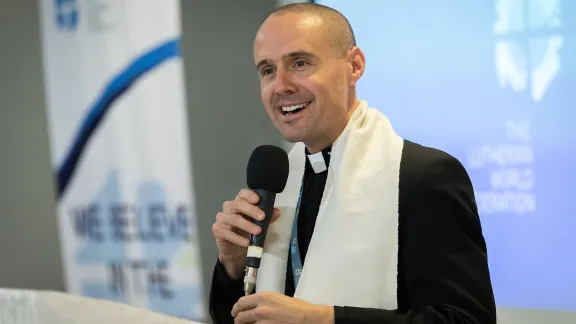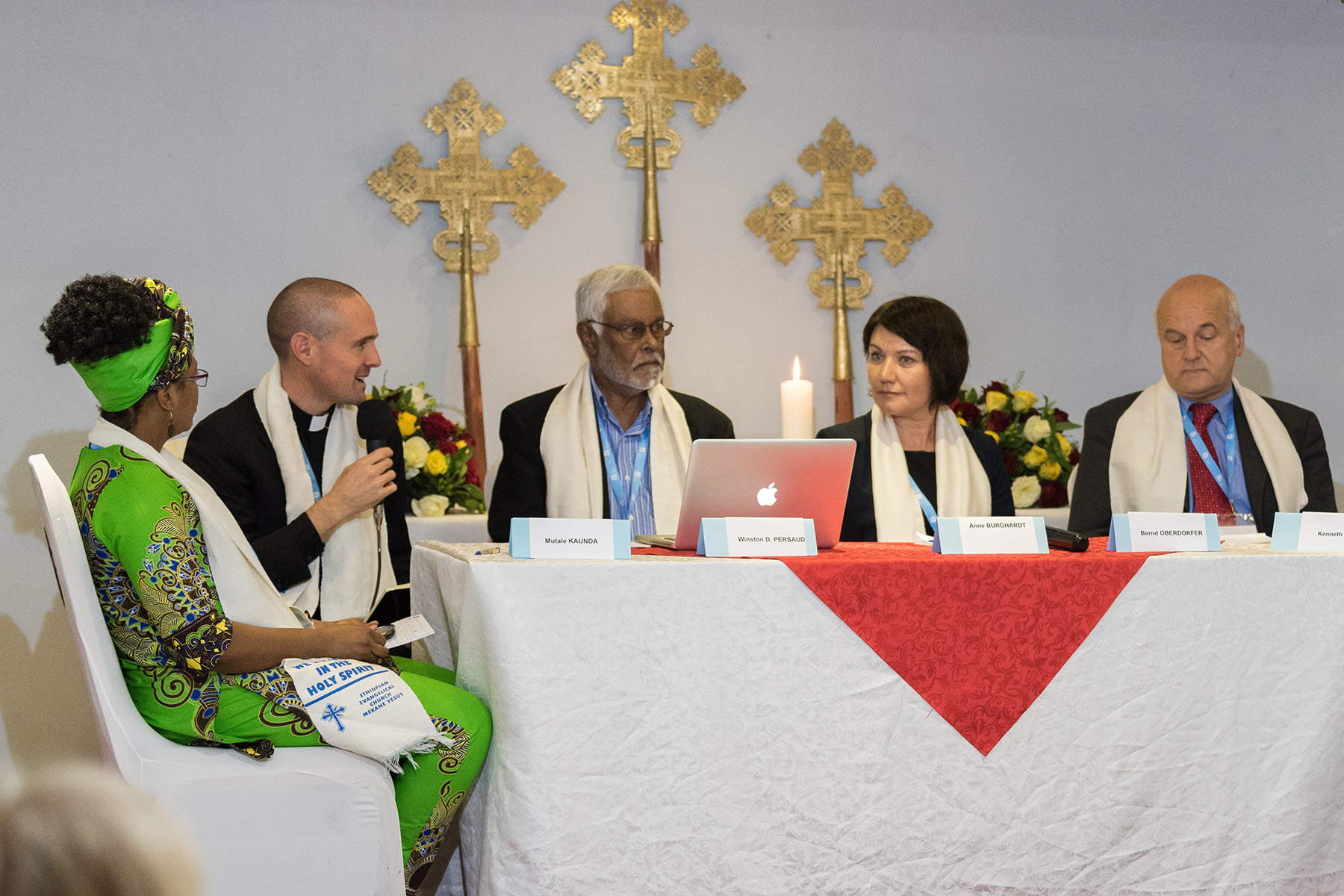
LWF Program Executive for Identity, Communion and Formation, Rev. Dr Chad Rimmer at the October 2019 Addis Consultation. Photos: LWF/A. Hillert
Study process calls on all LWF member churches to engage and share experiences of faith in diverse cultural contexts
(LWI) - Foundational Lutheran values of freedom, love and service to neighbor are increasingly needed as a counter-witness to societies’ growing narratives of exclusion and injustice. That vision lies behind an ongoing Lutheran identity study process which is calling on churches to engage in a global conversation about how the faith is lived and experienced in different cultural contexts around the world.
As the Lutheran World Federation (LWF) Program Executive for Identity, Communion and Formation, Rev. Dr Chad Rimmer was responsible for initiating the study process in 2019. Meeting together in the Ethiopian capital, Addis Ababa, theologians explored the principle identifying marks of their shared Lutheran heritage and the many diverse ways those are embodied in member churches and congregations across the globe.
Looking ahead to the next steps of that process, Rimmer reflects on the origins, the goals and the impact that the COVID-19 pandemic has had on this communion-wide initiative.
Why did you feel the need for a major new study process of this kind?
Questions about Lutheran Identity have been one of the pillars of the LWF since its founding in the wake of World War II. At that time there were serious questions about how to return, not only to the roots of our Lutheran heritage, but also how to live that out in public life. We recognize that theology is a critical part of the question, because it can contribute to the building up of societies, but it is also capable of tearing them down. So, we are constantly returning to these questions about who we are as Lutherans and what we are called to be as a global communion of churches.
Since those early days, we have been engaged in series of study processes focusing on ecclesiology, justice, or, most recently, the role of the Bible. In light of some of our confessional commitments, as well as in this age of narratives that are growing more exclusionary, we felt it was a good time to think how we respond together to those narratives of exclusion and injustice. We want to discover the roots of our unity and see what binds us together, whether we are younger or older churches, whether we are witnessing a decrease in members, or whether we are struggling with radical growth in numbers and spiritual life.
Given these radically different experiences of churches in different parts of the world, how difficult is it to agree on what forms part of a common Lutheran heritage?
It is very difficult, both because of our cultural and linguistic differences, but also our different genders, races and social locations. While we share the norms of the Bible, the Lutheran Confessions and unity in worship and ministry, Christian liberty means we are free to express our faith through our diversity. That can be a challenge, but it is also a deep well of rich resources. It also helps us to remember and to realize that being Lutheran is not a static identity, but rather it is always being negotiated and expressed in new and vibrant ways. This is the task of what we call constructive theology, to see how our identities are always being formed and influenced by different parts of our being.
Being Lutheran is not a static identity, but rather it is always being negotiated and expressed in new and vibrant ways.
The one thing that unites us is our profession of faith, that we are justified by grace through faith in Christ. This means that we are free to be in a relationship with God and in loving service to each other. This is not a proscriptive set of commitments, but rather a principle which frees us to live out our faith in diverse ways. A process like this helps us to step back to see that diversity does not create confusion, but instead a harmony of voices, or a great human tapestry.
Following the initial consultation in Ethiopia, you were planning to hold a series of regional gatherings but the pandemic made that impossible, didn’t it?
Yes, COVID-19 has radically changed this process, posing drawbacks but also unexpected gifts. Since we could no longer deploy into regional meetings, we were forced to rethink what was possible and pivoted into online mode which offered two particular gifts: firstly, a democratization of the process by opening it up to a broader cohort of people, lay and ordained, even though we realize that some are still excluded through a lack of internet access.
The webinars also allowed for a different mode of theological reflection, not just based on texts and presentations but offering more space for story-telling, for sharing images and narratives about our diverse experiences and cultures. It has become a model for “doing theology” in a range of embodied ways through our lived relationships.
Over the past months you have been running a series of webinars discussing different aspects of Lutheran identity – how successful have they been?
Perhaps you need to ask the hundreds of participants that question! From my experience, I think they have been very successful in creating space to continue the conversation and to take a deeper dive into the issues identified in the Addis consultation.

Participants at the global consultation in Addis Ababa in October 2019
Not only have we been able to identify distinctive marks that we share, such as liberty and freedom to act, or what it means to be theologians of the Cross, to deepen our spirituality or engage in diakonia, but we have also been able to center the voices that bring unique perspectives on these issues. It has been liberating and fruitful to hear voices of youth, women leaders, or indigenous Lutherans from different regions, and to have space for other individuals to engage with them.
The next stage of the process is harvesting feedback from all member churches who have received questionnaires and a study guide - what is the timeline for that?
Yes, the survey grew out of our original consultation, focused around the themes of the work of Holy Spirit in the church and how we are called with our various gifts to serve in different contexts. On the last day we gathered in regional groups and created questions that grew from our personal experiences and fed into the survey and discussion guide.
We hope that these will serve as a platform for congregations and individuals to engage on a range of questions on faith, from spirituality in music and the sacraments, to the understanding of confessional documents or how the Holy Spirit equips us for ministry. So, we urge all churches and parishes to engage with the survey and send feedback by the end of May.
What do you say to those who question the necessity of this process, given all the other challenges that churches are facing as a result of the COVID-19 crisis?
COVID-19 has taught us the importance of resilience. It has unmasked all the injustice and disparity in economics, healthcare, access to resources, and has pointed out the need for us to know where our sources of resilience lie. Undeniably, faith, being part of a faith community, is one of those resources. To that end, it is a good time to remind ourselves of who we are, how we are bound together, why we are called to love and serve each other, especially in times of need, and how are we equipped to respond.
It is also helpful to remember that the Lutheran Reformation began in the middle of great political and social upheaval, in the midst of climate change due to a little ice age in Europe at that time, and during a pandemic, as the plague returned. That was a time to return to the sources of our faith in order to ask who we are created to be and how we are called to love our neighbors, exactly in the midst of these situations.
One of the foundational pieces of Lutheran identity is that we are freed to love and serve each other. If this process can call us back to that, in the context of COVID-19, it can help us to let go of some of the other things that make claims on our life. I don’t see life as an exclusive zero-sum game, where there is a finite amount of time and energy, but I think the question is how does our faith give us the energy and resilience to really love and care for the dignity of our neighbor.
Finally, what can we expect from the concluding stages of this process and the concrete fruits that will emerge from it?
Yes, concretely, in June the LWF will publish a book of essays that were originally delivered at the Addis consultation. It is part of LWF’s Documentation series and will offer a wealth of insights from every region. Another concrete outcome will be the survey results, which we hope will feed into the next Assembly in Poland in 2023. Last, but not least, we are looking forward to a vibrant discussion on Lutheran identities at the Thirteenth Assembly in Krakow in 2023.
But along the way there are also some smaller scale fruits of projects, such as the circle of women theologians in Evangelical Lutheran Church in Tanzania which is producing a two-volume publication of their perspectives on Lutheran identity, or a robust project run by members of our Gurukul Lutheran Theological College in India to serve the churches there, or the youth league of ELCSA, the Evangelical Lutheran Church in Southern Africa that is leading a series of consultations on what it means to be young and Lutheran in that region today.
LWF/P. Hitchen


